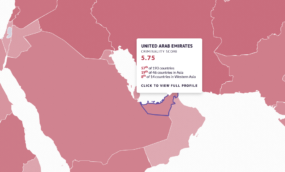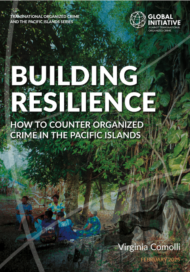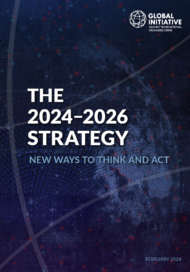Posted on 14 Jan 2025
Financial fraud has become increasingly widespread in Türkiye, a phenomenon linked to wider technological and social trends and driven by more organized and sophisticated networks. Although there is no comprehensive data on annual financial losses attributable to fraud or the number of victims affected by it, the sheer volume of fraudulent messages and calls received by its citizens highlights the extensive reach of fraud in the country.
Türkiye’s woes are part of a global trend. The 2023 Global Organized Crime Index found that financial crimes have become the most pervasive criminal market globally. Within this market, fraud alone contributed to an estimated US$486 billion in losses in 2023. Türkiye, which grapples with generally high levels of criminality, is particularly affected by this escalating threat. The Index ranked Türkiye high for financial crimes, with a score of 8.0 out of 10, putting it on a par with countries notorious for fraud, such as the Philippines, a centre for scam operations conducted in South East Asia.
Turkish citizens are no strangers to bold and innovative fraud schemes. In the past, scammers have lured victims with promises of quick returns, often through outlandish ventures, such as the sale of iconic Istanbul landmarks or non-existent real estate projects, ensnaring thousands of unsuspecting people. In recent years, these schemes have become more organized and diverse. Technology, including widespread use of social media, and the appeal of making easy money appear to have driven the growing incidents of fraud, making it increasingly difficult to combat.
In 2023, nearly a million fraud-related cases were brought to the Turkish public prosecutor’s office, involving various methods, such as identity theft, investment fraud, Ponzi schemes and advance fee scams. Notably, fraud does not always require the involvement of organized crime groups: it can be carried out by opportunistic individuals with basic technological know-how, and this figure includes both individual and organized fraud cases. However, recent law enforcement operations in Türkiye have uncovered the involvement of highly structured organized crime groups in these schemes, which explains the increasing impact and frequency of fraud in the country.
One noteworthy case was uncovered in early 2024, when a law enforcement operation revealed a syndicate operating four call centres in Istanbul. The operators pretended to be from courier companies and scammed people by charging them for uncollected parcels – just one of the methods this syndicate is thought to have used to defraud thousands of people. The syndicate was reportedly calling a thousand potential victims a day, earning around 200 000 Turkish liras – approximately US$6 000 a day – and distributing commissions to its ‘employees’ for each ‘win’.
But it is not only Turkish residents who fall victim to these schemes. Operated from the coastal town of Izmir, an even more audacious scam emerged, targeting elderly pensioners in Germany. The scheme involved criminals posing as police officers and convincing victims that their valuables were at risk. Accomplices would then be sent to collect their money, gold and jewellery, with the proceeds sent back to Türkiye through intermediaries using hawala, a money transfer system that is able to conceal illegal financial transactions. Investigations revealed that the operation was allegedly controlled by three families of Lebanese Kurds and is believed to have defrauded victims of a staggering €120 million between 2018 and 2022.
Türkiye has also become an increasingly attractive destination for international fraudsters. Its role as a source country for transnational organized fraud has intensified with the influx of Russian hackers relocating to the country to avoid military conscription since 2022. Many are reported to be focusing on low-level online fraud and scams, joining forces with established Turkish counterparts. Police officers have also noted that these newly formed groups have strategically avoided targeting Turkish citizens to minimize scrutiny from the authorities.
According to a recent Europol report on criminal networks, Türkiye is one of the primary non-EU countries where the most threatening criminal networks impacting the EU zone have established a presence. This was recently illustrated by the arrest of a global fraudster implicated in one of the largest cryptocurrency scams in history. The perpetrator, a Swiss national, was accused of defrauding approximately 3 million people worldwide, including victims from Belgium, France and the UK, of US$4 billion since 2019. He had been the subject of thousands of complaints and class-action lawsuits. Despite evading detection for several years, in 2024, the Swiss national was eventually discovered living in Istanbul by the Turkish authorities with his family, having acquired Turkish citizenship and a Turkish name. His ability to remain under the radar while acquiring citizenship highlights the country’s allure as a potential safe haven.
Indeed, Türkiye’s appeal to seasoned criminals, including notorious fraudsters, has been bolstered by the Citizenship by Investment programme. This initiative, which was launched in 2017, allows people to acquire Turkish citizenship through investment while benefiting from extradition protection for Turkish citizens, as enshrined in the Turkish Constitution. The programme is seen as controversial, in that it provides a legal pathway for criminals to put down roots in the country, allowing them to launder their illicit gains.
There also appears to be extensive under-reporting of incidents of fraud. This may be because victims do not speak out, concerned about the implications and their reputational damage, and because there tend to be low investigation and conviction rates. According to a survey published in 2024, only one in three fraud victims in Türkiye file a complaint with the authorities. This means that many organized fraud cases go under the radar and do not receive the attention they deserve, which also hampers a comprehensive understanding of the market and the damage caused to victims.
Although it has not fully got to grips with the growing fraud phenomenon, Türkiye is nevertheless taking steps to implement measures to combat it. Media reports highlight regular crackdowns on criminal networks engaged in fraudulent activities, including e-commerce website scams, investment fraud and credit card fraud. Based on the complaints filed by victims, law enforcement agencies have conducted operations to dismantle these syndicates thanks to a new special fraud unit. Efforts to digitize services, combined with enhanced security protocols, aim to curb fraudulent activities in transactions such as asset sales.
However, the credibility of these efforts has been undermined by recent reports of the release of the suspects involved in the network targeting pensioners in Germany. Initially sentenced to a combined 1 128 years in prison, the suspects were released following a higher court ruling. This decision came despite investigations by Turkish and German authorities, criminal charges against other members of the group in Germany and active international arrest warrants. The case raises serious concerns about judicial independence and the integrity of the criminal justice system in Türkiye. However, it also underscores the critical need for strong foundational resilience mechanisms, such as an independent judiciary free from interference and well-equipped law enforcement agencies. These are areas where Türkiye has chronically underperformed, falling well below the global averages in the 2023 Index for its ‘judicial system and detention’ and ‘law enforcement’ mechanisms.
Strengthening these core systems will be essential for ensuring an effective response to criminal markets in Türkiye, especially those as pervasive and rapidly evolving as organized fraud. Türkiye has shown an appetite to address concerns around the phenomenon of complex fraud schemes. However, a more resolute stance in imposing strict penalties for fraudsters to the fullest extent of the law will be critical if it is to have a real impact.
This analysis is part of the GI-TOC’s series of articles delving into the results of the Global Organized Crime Index. The series explores the Index’s findings and their effects on policymaking, anti-organized crime measures and analyses from a thematic or regional perspective.



